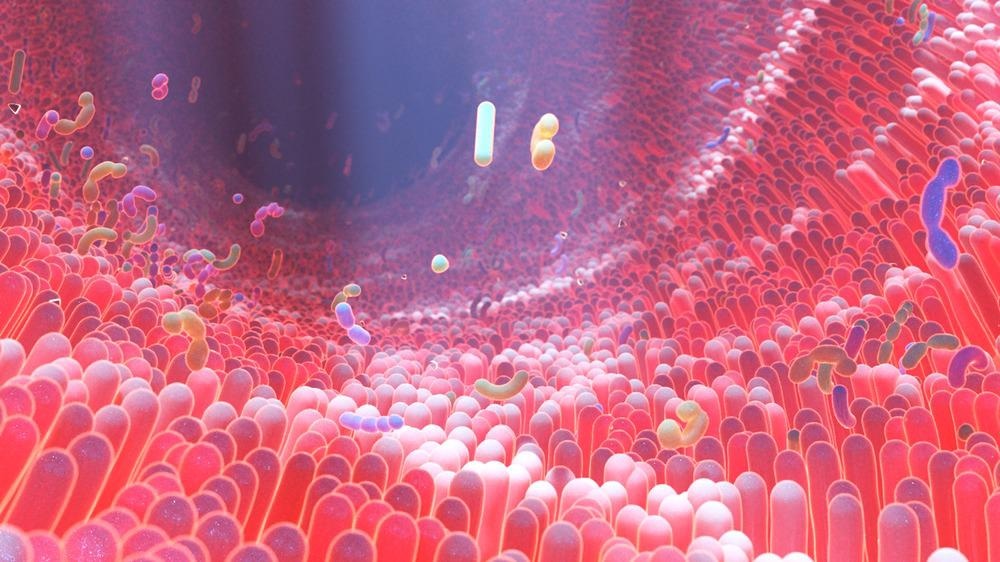Diet is one of the many environmental factors that has been linked to various pathophysiologies including cancer, diabetes, and heart disease. The industry surrounding diet, nutrition, and well-being is enormous, but little has been elucidated about how diet can affect DNA. Carcinogens have been observed in food: both in ingredients and the cooking process.

Image Credit: nadianb/Shutterstock.com
Research is now focusing on the role of epigenetics in governing susceptibility to conditions such as obesity, Type 2 Diabetes (T2D), and others. The microbiota in the gut can also play a critical role in the metabolism of precursor molecules that modulate the epigenetic signature. Diet can play a critical role in modulating the abundance and distribution of the microbiota.
Epigenetics
Epigenetics is the study of modifications on DNA and histones at critical periods in development and growth that can confer modifications to progeny. DNA methylation is critical in regulating gene expression. Regions that are rich in Cytosine-Guanine sequences are often present at the 5’ end of a gene sequence (so-called CpG dinucleotide islands). These regions are often subject to methylation: the covalent attachment of a methyl moiety.
Hypermethylation is associated with the silencing of gene expression while hypomethylation is associated with increased expression. DNA is packaged as chromatin: a 147 base pair DNA sequence is looped around a core of eight histone proteins. Methylation and acetylation of the histones can modulate access to the DNA and gene expression. Both modifications are regulated by specific enzymes that can add or remove the associated moiety.
Pre-natal aspects
Historical events have helped to inform studies about how pre-and post-natal nutrition can impact the health of the progeny, even into adulthood. Dutch famine records demonstrated an increased observance of insulin resistance and glucose intolerance in the offspring of mothers who experienced malnutrition during pregnancy. Maternal nutrition has been linked to the DNA methylation profile in the hypothalamus of offspring. The hypothalamus is critical for the regulation of energy metabolism and modifications during development can have implications into adulthood.
Breast feeding has been associated with an altered methylation profile. Milk lipids can activate Peroxisome Proliferator-Activated Receptor-α (a critical regulator of hepatic metabolism). One important downstream molecule is Fibroblast Growth Factor 21 – a regulator of body weight and energy homeostasis. Decreased hypomethylation patterns are observed in those who were breast-fed in these proteins: this was associated with reduced diet-induced obesity later in life.
Different modifications and diet
Diet provides the resources necessary to modulate DNA modification. The relative abundance of critical precursors in the diet has a significant role to play in the methylation signature. S-Adenosyl methionine (SAM) is a critical donor of methyl moieties. It is derived from nutrients such as methionine, folate, choline, betaine, and Vitamins B2, B6, and B12. The abundance of these molecules moderates the reservoir of SAM, in turn regulating the methylation of DNA.
Animal studies involving supplementation or deprivation of these substrates affected relative abundances of SAM but did not have any significant differential methylation. This suggests that diet induces perturbations in the substrates and enzymes associated with DNA methylation but the evidence for lasting effects is lacking and requires larger, longitudinal studies to disseminate.
Another animal study highlighted the role of diet in modulating susceptibility to metabolic perturbations in progeny. Mothers were fed a high-fat diet during gestation (and lactation). The pups were then subjected to the same diet or a control diet. The results indicated that even after being taken off the high-fat diet the pups experienced increased hyperglycemia and insulin resistance compared to the control cohort due to different methylation on key metabolism factors.
Gut microbiota
Microbes form an integral part of our physiology: their metabolism of nutrients plays an important role in modulating histone and DNA modification. Critically, the production of Short Chain Fatty Acids (SCFAs) by bacteria act as an important reservoir of cofactors for epigenetic enzymes. Westernized diets reduce the abundance of these SCFAS, altering hepatic enzyme expression.
The relative abundance of different species of bacteria can induce different methylation signatures, pre-disposing humans to pro-inflammatory environments, a greater tendency to obesity/T2D, and other pathophysiologies.

Image Credit: Alpha Tauri 3D Graphics/Shutterstock.com
Cancer
There is very limited evidence to link specific foods to cancer. Carcinogens have been observed in ingredients and certain cooking processes. There is insufficient data to determine critically whether these products induce cancer, especially in humans. These carcinogens are known to induce DNA adducts; these can play a critical role in the progression of neoplasia.
Acrylamide is a probable human carcinogen that has been observed in the high-temperature cooking of starchy products. Furans are possible human carcinogens that are observed during the heating of products such as coffee, soy, caramel, bread, and meat.
Polycyclic Aromatic Hydrocarbons and Heterocyclic Aromatic Amines are observed in meats cooked at high temperatures or on open flames. N-Nitroso compounds include beer, certain spices, smoked fish and smoked fish products, and meat products such as smoked or cured pork, sausages, fried bacon (including nitrosamines and nitrosamides).
T2D and obesity
Large epigenetic studies have been conducted to investigate whether there is an altered methylation pattern in T2D patients. The results demonstrate that there is a different profile in many candidate genes, but it is unclear whether this is antecedent to T2D formation or as a result. Hypomethylation is often found in the liver biopsies from T2D subjects.
High exposure to palmitate (a common saturated fat) and glucose modulates methylation profiles in many key genes such as Insulin Growth Factor 2, INS-IGF Readthrough Transcript Protein, and Leptin. Leptin and adiponectin are critical regulators of metabolism, and their levels are often dysregulated in T2D. Maternal hyperglycemia decreases Leptin DNA methylation levels in offspring and is associated with higher cord blood leptin levels, predisposing them to weight gain and dysregulated metabolism.
Sources:
- D’Aquila, P. et al. (2020) ‘Gut Microbiota as Important Mediator Between Diet and DNA Methylation and Histone Modifications in the Host’, Nutrients, 12(3), p. 597. doi: 10.3390/nu12030597.
- Hemeryck, L. Y. and Vanhaecke, L. (2016) ‘Diet-related DNA adduct formation in relation to carcinogenesis’, Nutrition Reviews, 74(8), pp. 475–489. doi: 10.1093/nutrit/nuw017.
- Jang, H. and Serra, C. (2014) ‘Nutrition, Epigenetics, and Diseases’, cnr, 3(1), pp. 1–8. doi: 10.7762/cnr.2014.3.1.1.
- Ling, C. and Rönn, T. (2019) ‘Epigenetics in Human Obesity and Type 2 Diabetes’, Cell metabolism. 2019/04/11, 29(5), pp. 1028–1044. doi: 10.1016/j.cmet.2019.03.009.
- Zhang, Q. et al. (2019) ‘A Maternal High-Fat Diet Induces DNA Methylation Changes That Contribute to Glucose Intolerance in Offspring ’, Frontiers in Endocrinology , p. 871. Available at: https://www.frontiersin.org/article/10.3389/fendo.2019.00871.
- Zhang, Y. and Kutateladze, T. G. (2018) ‘Diet and the epigenome’, Nature Communications, 9(1), p. 3375. doi: 10.1038/s41467-018-05778-1.
Further Reading
Last Updated: Jul 21, 2022